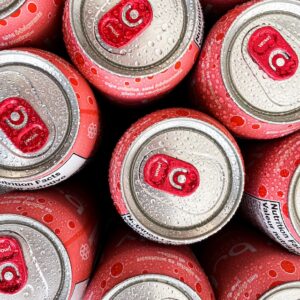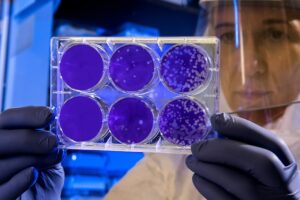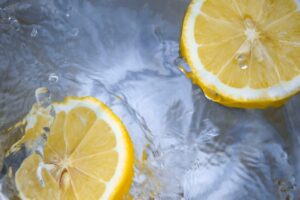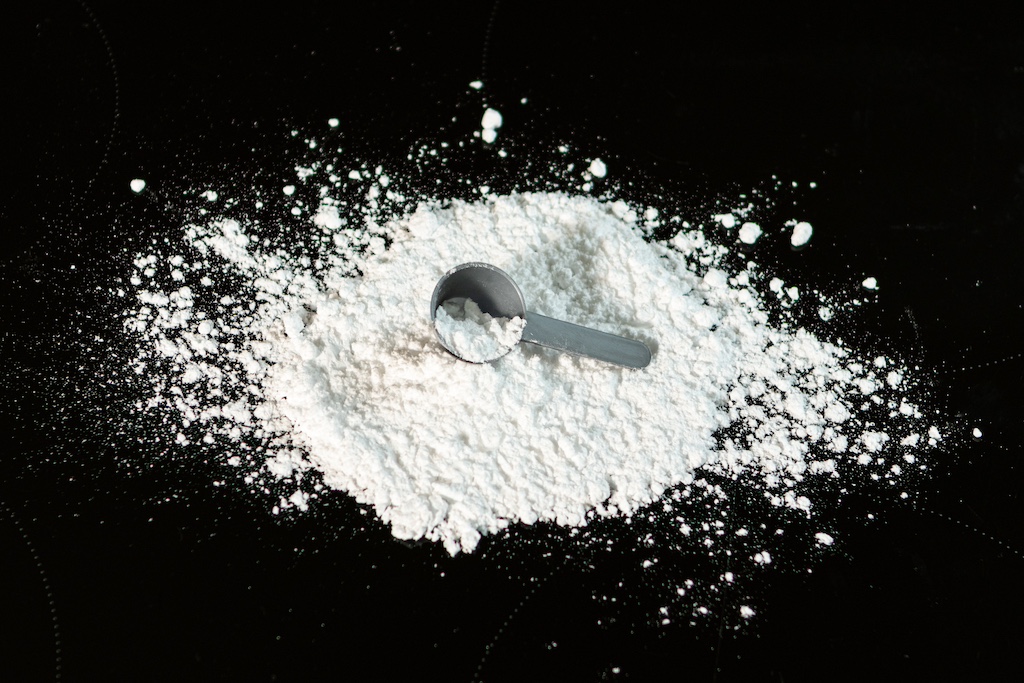There’s a reason we don’t use Potassium Sorbate at Virun.
Plenty of research points to potassium sorbate’s role in causing mutagenic and carcinogenic responses in human and animal cells. In this post we explore what Potassium Sorbate is, its prevalence and how it can become carcinogenic. We also discuss why we choose not to use Potassium Sorbate in the supplements that we formulate at Virun.
What is Potassium Sorbate?
Potassium sorbate is a vinegary sodium salt. It is naturally found in very small amounts in fruits, vegetables, and plants. It is an antimicrobial compound that is chemically synthesized to be used as a potent preservative in foods for human consumption. It has been used to replace the highly controversial Sodium Benzoate as a food preservative for decades. You will find potassium sorbate in numerous fizzy drinks, fruit juices, processed and pre-packaged foods, as well as in liquid supplements.
It sounds benign enough. However, like several naturally sourced raw materials, once they have been isolated, synthesized, and blended with other ingredients they can chemically restructure and become disruptive to our heath.

Is Potassium Sorbate Safe? Side Effects of Potassium Sorbate
As a standalone ingredient, potassium sorbate is known to upregulate inflammation, cause mild allergic reactions and alter the gut microbiome. A monocarboxylic compound, it is highly reactive to temperature, PH, processing, and other ingredients. In particular with nitrates and iron salts, which can lead to mutagenic (gene mutating) responses in human cells and resulting DNA damage.
Potassium sorbate prevents the growth of mould by disrupting the cell membrane’s function, electron transport and metabolic activity.[i] This triggers an increase in Reactive Oxygen Species (ROS) within the cell, destabilising the cell’s ability to communicate and correctly replicate DNA, and depletes the cells’ essential glutathione stores. Glutathione is the super antioxidant that protects our healthy cells from oxidative stress. The malfunctioning oxidized and mutated cell has insufficient glutathione stores to self-repair, yet it may still survive and replicate the damaged DNA. Mutated cells which proliferate are more likely to become carcinogenic.

Potassium Sorbate’s Reactivity with Nitrates
Nitrates are pervasive; you will find them naturally in plants and vegetables. Nitrates are added to processed foods in the form of sodium nitrate. As nitrates are heavily utilized in the agricultural and manufacturing industries, the runoff often ends up in drinking water. In the US, drinking water contains more than 3mg nitrates per litre.[ii]
Potassium Sorbate reacts with the nitrates in water to from several species of direct-acting mutagens and genotoxic agents that present a very real potential health risk.[iii] This means that when potassium sorbate is employed as a preservative in foods or drinks that contain water, you will likely be exposed to toxic compounds and potential mutagens.
So that fizzy drink could contain carcinogens—and without even considering the suspect aspartame sweetener and BPAs that’s probably in it too!
Studies on humans have shown how the presence of nitrates with potassium sorbate have mutagenic and genotoxic effects on blood cells, cause chromosome aberrations and DNA breakage.[iv] Research on rats have corroborated this by demonstrating the genotoxic effect of the blend on mammalian cells. Further studies have shown broad systemic and toxic effects on non-reproductive organs in animals. [v]
Pretty shocking, right? There’s more to it: nitrates are not the only compounds that cause potassium sorbate to become harmful. Ascorbic acid, iron and gluconate can form toxic compounds when combined with potassium sorbate.[vi]

Potassium Sorbate’s Reactivity with Vitamin C and Iron
The combination of potassium sorbate, ascorbic acid, and iron salts can lead to the formation of potentially mutagenic compounds called alkyl glycosides.[vii]
Separate studies in both the Journal of Food Additives and Contaminants and the Journal of Agricultural and Food Chemistry found that beverages which contained potassium sorbate, iron and/or ascorbic acid which were processed under heat discovered that the alkyl glycosides produced by this combination had mutagenic activity.[viii]
Furthermore, these materials tend to create mutagenic compounds that cause DNA damage, including: “pharyngeal lesions, cell inflammation, epithelial glandular formation, vascular hyperplasia, and edematous exchange” even at low doses.[ix]
Whether unwittingly combined with nitrates (through tap water) or deliberately combined with iron salts and ascorbic acid, mutagenic compounds are inevitably generated and ingesting these is not optimal for our health.
Putting Potassium Sorbate in the Hot Seat
Many liquid vitamin c, iron and other mineral supplements use potassium sorbate as a preservative. And most packaged and processed foods, drinks and supplements need to be heat processed (pasteurized) to prevent bacterial growth and subsequent bacterial poisoning. We now know that this is a detrimental concoction. Unfortunately, most liquid health supplements that use potassium sorbate then contain potential genotoxins and carcinogens.
Which makes them almost unavoidable—you have to learn to vigilantly read labels and come up with alternative solutions—which is exactly what we have done at Virun.
We have IP that Negates the Need for Potassium Sorbate
At Virun, we have extensive IP that allows us to make liquid supplements without potassium sorbate or preservatives which means that your supplements will not contain carcinogens.
We have a natural and organic patented stability technology to prevent microbial, yeast and mold growth in supplements to avoid the need for toxic preservatives. In addition, to optimize flavor and remove oxidate contaminants, we use our own patented Bicarbonate Down Stream Process.
We go to great lengths to ensure that all our supplements are free from toxic ingredients, and contra-indicative blends. We steer clear from the usual culprits: such as artificial sweeteners and seed oils. We deliver innovative, scientifically rigorous solutions which optimize supplement bioavailability and enhance your customer’s health.
[i] K Kitano, T Fukukawa, Y Ohtsuji, T Masuda, H Yamaguchi,Mutagenicity and DNA-damaging activity caused by decomposed products of potassium sorbate reacting with ascorbic acid in the presence of Fe salt, Food and Chemical Toxicology, 40 (11) 2002, Pages 1589-1594, ISSN 0278-6915
[ii] https://www.health.state.mn.us/communities/environment/water/docs/contaminants/nitratefctsht.pdf
[iii] Hartman, P.E. (1983), Review: Putative mutagens and carcinogens in foods. II: Sorbate and sorbate-nitrite interactions. Environ. mutagen, 5: 217-222. https://doi.org/10.1002/em.2860050209
[iv] Parvin Dehghan, Ali Mohammadi, Hossein Mohammadzadeh-Aghdash, Jafar Ezzati Nazhad Dolatabadi,
Pharmacokinetic and toxicological aspects of potassium sorbate food additive and its constituents, Trends in Food Science & Technology, 80 2018, Pages 123-130, ISSN 0924-2244
[v] Parvin Dehghan, Ali Mohammadi, Hossein Mohammadzadeh-Aghdash, Jafar Ezzati Nazhad Dolatabadi,
Pharmacokinetic and toxicological aspects of potassium sorbate food additive and its constituents, Trends in Food Science & Technology, 80 2018, Pages 123-130, ISSN 0924-2244
[vi] K Kitano, T Fukukawa, Y Ohtsuji, T Masuda, H Yamaguchi,Mutagenicity and DNA-damaging activity caused by decomposed products of potassium sorbate reacting with ascorbic acid in the presence of Fe salt, Food and Chemical Toxicology, 40 (11) 2002, Pages 1589-1594, ISSN 0278-6915
[vii] Clegg, B.S., Scott, K.G., & Cote, L.M. (1998). Mutagenic activity of alkyl glycosides formed by the reaction of ascorbic acid and iron with sorbate in a model beverage. Food Additives and Contaminants, 15 (4), 441-450. Doi. 10.1080/026520398093726
[viii] Clegg, B.S., Scott, K.G., & Cote, L.M. (2000) Influence of pH, temperature, and iron concentration on the formation of alkyl glycosides in a model beverage system. Journal of Agricultural and Food Chemistry,
48(4), 1134-1141. doi: 10.1021/jf990765i
[ix][ix] K Kitano, T Fukukawa, Y Ohtsuji, T Masuda, H Yamaguchi,Mutagenicity and DNA-damaging activity caused by decomposed products of potassium sorbate reacting with ascorbic acid in the presence of Fe salt, Food and Chemical Toxicology, 40 (11) 2002, Pages 1589-1594, ISSN 0278-6915

